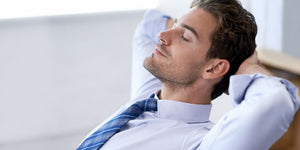How To Help Hangover Anxiety In 7 Steps

Hangover anxiety can ruin your morning and afternoon, making it near impossible to function throughout the day in the ways that you usually do.
Hangover anxiety, also called hangxiety, is a surprisingly a common problem.
Searching for how to help hangover anxiety? Almost everyone wants to reduce hangover anxiety in some way or another and today we’re going to look at exactly how you can do this using 7 simple steps you can take right away.
How To Help Hangover Anxiety In 7 Steps
Hangover anxiety refers to feelings of anxiety that accompany a hangover. People who experience hangover anxiety, or hangxiety, report feeling more anxious than normal after drinking too much alcohol, or during periods when their blood alcohol content is still high.
This heightened state of anxiety can resemble an anxiety attack, and may be accompanied by symptoms like nausea, restlessness, sweating or shaking.
This is the article you should read if you want to learn how to help hangover anxiety in seven steps.
Those 7 steps are:
1. Get Hydrated
Alcohol dehydrates your body, which can make anxiety worse. And water is key for flushing out toxins from your system worsened by alcohol.
Replenish by drinking water throughout the day. Make sure to drink water before going to sleep after a night of drinking, and keep a bottle by your bedside in case you wake up in the middle of the night.
Also consider adding a hydration product, such as
Zaca, to enhance your body's hydration.
2. Get Good Sleep
Sleeping problems are frequently connected to anxiety.
It's clear that drinking alcohol impairs sleep quality, and lack of sleep can increase anxiety and lead to a negative cycle involving insomnia and restlessness.
The more you can sleep after drinking, the better. A pro-tip is to simply take a nap the next day, as people often have trouble sleeping in after too much alcohol.
3. Exercise and Move Your Body
If you wake up in the morning and you're feeling a little anxious with a hangover, the best thing you can do is get out of bed and move your body.
Exercise helps your body release chemicals that will increase your mood and make you feel better.
-
Science shows when you move your body, it decreases the muscle tension in your body, which in turn lowers the body's contribution to feeling anxious.¹
- Increasing your heart rate can release anti-anxiety neurochemicals like serotonin, GABA, BDNF, and endocannabinoids which can help to reduce anxiety.¹
We're not saying that you need to go for an intense workout or sweat bullets, but just getting outside for a walk around the block will help clear your mind and improve your mood from the hangover.
4. Eat a Healthy, Balanced Diet
When you're drinking alcohol, your body is struggling to process the toxins. It's working hard and you could be feeling the effects of that in the form of a hangover or anxiety.
Another way to counteract this is to eat a healthy, balanced diet. Protein, fresh fruits, vegetables, and complex carbohydrates (not processed) are best.
This will help to reduce the symptoms of your hangover and help you recover more quickly by providing your body with vital nutrients (as there's some
vitamins to prevent hangover).
5. Take a Shower
The next morning when you wake up, take a hot shower. If you're brave enough, start the shower ice cold, then switch to hot after a minute.
This will get your blood flowing, which will help you feel more alert and alive from the anxiety you're fighting.
Specifically cold showers may also work by increasing the levels of endorphins in your brain. This would lead to a feeling of happiness and well-being.
Either way, there's just nothing better than a nice shower to help receive a hangover in the morning.
5. Breathe Deeply To Be Less Anxious
We tend to hold our breath when we're anxious, but taking deep breaths actually helps us feel less tense.
This can help calm your pounding heart and the butterflies in your stomach.
Some people even choose to meditate in the morning after they've had a drink or two. It's a great way to relax and clear your mind!
6. Limit the Amount of Caffeine You Drink
But a 2005 study found that too much caffeine can cause psychiatric symptoms such as sleep disorders and anxiety.²
Make sure to only drink coffee or caffeine in moderation while feeling hangover anxiety, or it may have the opposite effect.
7. Take a Herbal Supplement For Hangxiety
DHM (dihydromyricetin), for example, is a natural antioxidant that has the ability to improve stress, mood, and anxiety.⁴
The University of Southern California School of Pharmacy found that DHM has the ability to reduce neuro-inflammatory changes that are produced by anxiety, therefore having anxiety reducing properties.⁴
Conclusion On How To Help Hangover Anxiety
Next time you’re hungover and want to know how to help hangover anxiety, try out some of these suggestions to help alleviate your symptoms. By following these 7 simple steps, you can help keep your hangover anxiety at bay.
Want to take a DHM supplement? Try our Zaca chewables loaded with DHM-containing herbal ingredients!
SOURCES
1. Can exercise help treat anxiety?
https://www.health.harvard.edu/blog/can-exercise-help-treat-anxiety-2019102418096
2. Neuropsychiatric effects of caffeine
https://www.cambridge.org/core/journals/advances-in-psychiatric-treatment/article/neuropsychiatric-effects-of-caffeine/7C884B2106D772F02DA114C1B75D4EBF
3. Does Caffeine Cause Anxiety?
https://www.healthline.com/health/caffeine-and-anxiety#caffeine-and-anxiety
4. Social Isolation Induces Neuroinflammation And Microglia Overactivation, While Dihydromyricetin Prevents And Improves Them
https://www.ncbi.nlm.nih.gov/pmc/articles/PMC8491854/
